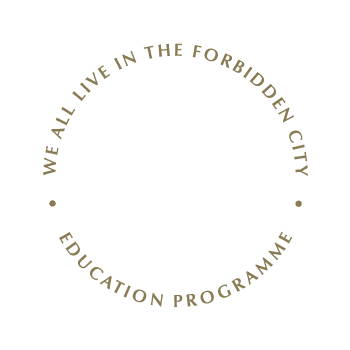Being located in Panyu,Guangzhou City,Yu Yin Shan Fang was built in the tenth year (1871) of Tongzhi Emperor in Qing Dynasty and it is one of the four most famous gardens in Guangdong. In the morning of December the 20th, tutors and members of workshop started the tour from Hong Kong. After three hours' drive they finally arrived in this refreshing and peaceful Lingnan style garden. By exploring this beautiful garden, tutors had a chance to study garden architecture, so as to provide inspiration and knowledge to the new course "Strolling in the Imperial Garden".
Tutors of "We All Live in The Forbidden City" program carried out two workshops in Kelly and Walsh bookstore in Pacific Place. Children accompanied by their parents experienced the course "The Best Palace" in a very delightful atmosphere.
The education team found a way to offer educational activities for after-school care programme in the community, so that more children had the chance to experience lively, multi-faceted educational activities and thus develop greater interest in Chinese culture.
To enable more young people to join the summer outreach programme, the teaching team hosted educational activities in Putonghua for children aged 4 to 12 at Asia Society. In this way, children returning from abroad for summer vacation also had the chance to join.
The team joined a guided tour for the "A Lofty Retreat from the Red Dust" Exhibition, jointly organized by the Hong Kong Museum of Art and the Palace Museum. The artifacts of the "Qianlong Garden" offered the audience the opportunity to learn more about the Emperor Qianlong and his unique imperial garden.
From July to August 2012, the education team condensed "The Best Palace" education outreach workshop into summer activities at public libraries, but the target was extended from primary students to kindergarten grade three students. The workshops provided more channels for them to learn more about Chinese culture, with a view to trigger greater interest in it. Complemented by the book series, participants were encouraged to read on the topic.
Apart from large-scale community space, we also implemented some educational and promotional activities at Hong Kong Book Centre for parents to learn the Chinese culture in a fun way through our outreach programme and book series. The education team hopes to create a learning experience for both parents and children to interact with each other. We also wish to develop parent-child educational programme in the future.
We value collaborating and exchanging insights with local universities. The teaching team was invited to join the 10th Seminar on Chinese Moral Education organized by New Asia College of the Chinese University of Hong Kong to share with other participating teachers their experiences and reflections.
The Hong Kong Museum of Art has organized a sharing session as part of the educational activities for the exhibition "Lofty Retreat from the Red Dust: The Secret Garden of Emperor Qianlong". Our teaching team and studio members made a debut attempt to discuss with public the traditional culture using contemporary language and technology, such as animation, interactive games and QR-code.
The education team hopes to encourage children to explore the connection between modern life and Chinese cultural values. As the theme of this year's Hong Kong & Shenzhen Bi-City Biennale is "Tri-ciprocal Cities: The Time, The Place, The People", the education team is honoured to be invited to share with young people the relationship between traditional architecture and nature through having them "roam" inside the Forbidden City at the Heritage Discovery Centre. The workshop uses simple model of the palace to create a learning platform for discussing the modern implication of space planning and living.
The teaching team exchanged views with the production crew of the documentary channel The Forbidden City of the Central Television. The crew also visited local primary schools to get to know how our tutors implemented cultural education activities in Hong Kong. In addition, the teaching team met with some directors during our visit to Beijing with a view to experience the cultural customs of the capital.
Learning the education and promotion approach at various places helps the team to make plans for our way forward. During its field trip to Beijing, the educational team met with the education department of the Palace Museum. We also paid a visit to the showroom used for educational activities, where we learned and experienced for ourselves the use of multimedia in the cultural educational activities organized by the education department.
In early 2012 when the education team went to Beijing for a field trip, we were fortunate to have the chance to go into the restricted areas of the Palace, and exchange views with Mr Wang Yamin, the Vice-president of the Palace Museum, and the team of Forbidden City Publishing House.
In early 2012, the education team had a field trip to the Forbidden City in Beijing, with a view to see for themselves the modern look of the teaching subject, as well as to discuss and reflect on the cultural values embodied in the Forbidden City. Other sites during the trip included Beijing Planning Exhibition Hall, the National Museum and the Summer Palace. The team also exchanged views with Forbidden City Press, the education department of the Palace Museum and the production crew of the documentary channel The Forbidden City of the Central Television.
Took a close look at the architecture of the Asia Society and learn how historic space is preserved and revitalized. Additionally, the teaching team also visited Transforming Minds: Buddhism in Art, an exhibition of Buddhist works. The tour enriched their understanding of different aspects of the Chinese culture.
During the process of preparing for the brand new course "Strolling in the Imperial Garden" ready, the teaching team kept experimenting and amending the lesson plan as they conducted more research, clarified some concepts and made props for teaching. All these effort was made with the aim of putting forward better activities to enable students to understand the cultural values well.
For the programme "Geo Hong Kong", Dr Joseph Ting was invited to brought the participants on a walking tour along Hollywood Road. As they visited the Fringe Club, Central Police Station, Lyndhurst Terrace and the historic sites of the Dr Sun Yat-sen Historical Trail, the education and studio teams also joined to walk through local culture and history.
We take seriously the training and evaluation of the teaching team in the teaching process. Before the educational outreach programme of "The Best Palace" for schools and public was launched, the teaching team rehearsed for the workshop series and prepared the teaching materials. Children were invited to join the pilot workshops; their feedback helped us adjusted the content and teaching of the programme.
















